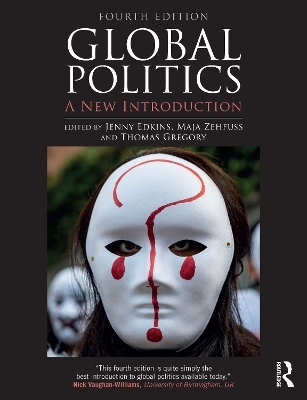
Global Politics
Routledge (Verlag)
978-1-032-52085-8 (ISBN)
- Noch nicht erschienen (ca. Januar 2025)
- Versandkostenfrei innerhalb Deutschlands
- Auch auf Rechnung
- Verfügbarkeit in der Filiale vor Ort prüfen
- Artikel merken
Global Politics: A New Introduction engages directly with questions that those coming to the study of world politics bring with them. From that innovative starting point, it explores key issues through a critical and inquiring perspective, presenting theoretical ideas and concepts in conjunction with a global range of historical and contemporary case studies.
Revised and updated throughout, the fourth edition offers examples engaging with the latest developments in global politics: the climate crisis and anthropocentrism, Indigenous experiences and thinking, racism and the rise of xenophobia, artificial intelligence, citizen journalism, global health and pandemic response and drone warfare.
Global Politics:
• examines most significant issues in global politics – poverty, development, colonialism, human rights, gender, inequality, race, war, peacebuilding, security, violence, nationalism, authority and what we can do to change the world;
• offers chapters written to a common structure ideal for teaching and learning and features a key question, an illustrative example, general responses and broader issues;
• integrates theory and practice throughout the text, drawing on international relations, political theory, postcolonial studies, sociology, geography, peace studies and development.
This exciting, up-to-date and ground-breaking textbook is essential reading for all those concerned about global politics.
Jenny Edkins is Honorary Professor of Politics at The University of Manchester and Professor Emeritus at Aberystwyth University, UK. Maja Zehfuss is Professor of International Politics at the University of Copenhagen, Denmark. Thomas Gregory is Senior Lecturer in Politics and International Relations at the University of Auckland, New Zealand.
1 Introduction
2 How do we begin to think about the world?
3 Why do some people think they know what is good for others?
4 When do we think global politics began?
5 What happens if we don’t take nature for granted?
6 Can we save the planet?
7 Who do we think we are?
8 How do religious beliefs affect politics?
9 Why do we obey?
10 How do we find out what’s going on in the world?
11 What does AI do to politics?
12 Why is people’s movement restricted?
13 Where do we think we are from?
14 Does the nation-state work?
15 How is the world organized economically?
16 How does colonialism work?
17 Do colonialism and slavery belong to the past?
18 How does finance affect the politics of everyday life?
19 How can we end poverty?
20 Why does politics turn to violence?
21 What makes the world dangerous?
22 Can we move beyond conflict?
23 Who has rights?
24 Conclusion: What can we do to change the world?
| Erscheint lt. Verlag | 31.1.2025 |
|---|---|
| Zusatzinfo | 9 Line drawings, color; 218 Halftones, color; 227 Illustrations, color |
| Verlagsort | London |
| Sprache | englisch |
| Maße | 178 x 254 mm |
| Themenwelt | Sozialwissenschaften ► Politik / Verwaltung ► Europäische / Internationale Politik |
| ISBN-10 | 1-032-52085-X / 103252085X |
| ISBN-13 | 978-1-032-52085-8 / 9781032520858 |
| Zustand | Neuware |
| Haben Sie eine Frage zum Produkt? |
aus dem Bereich


